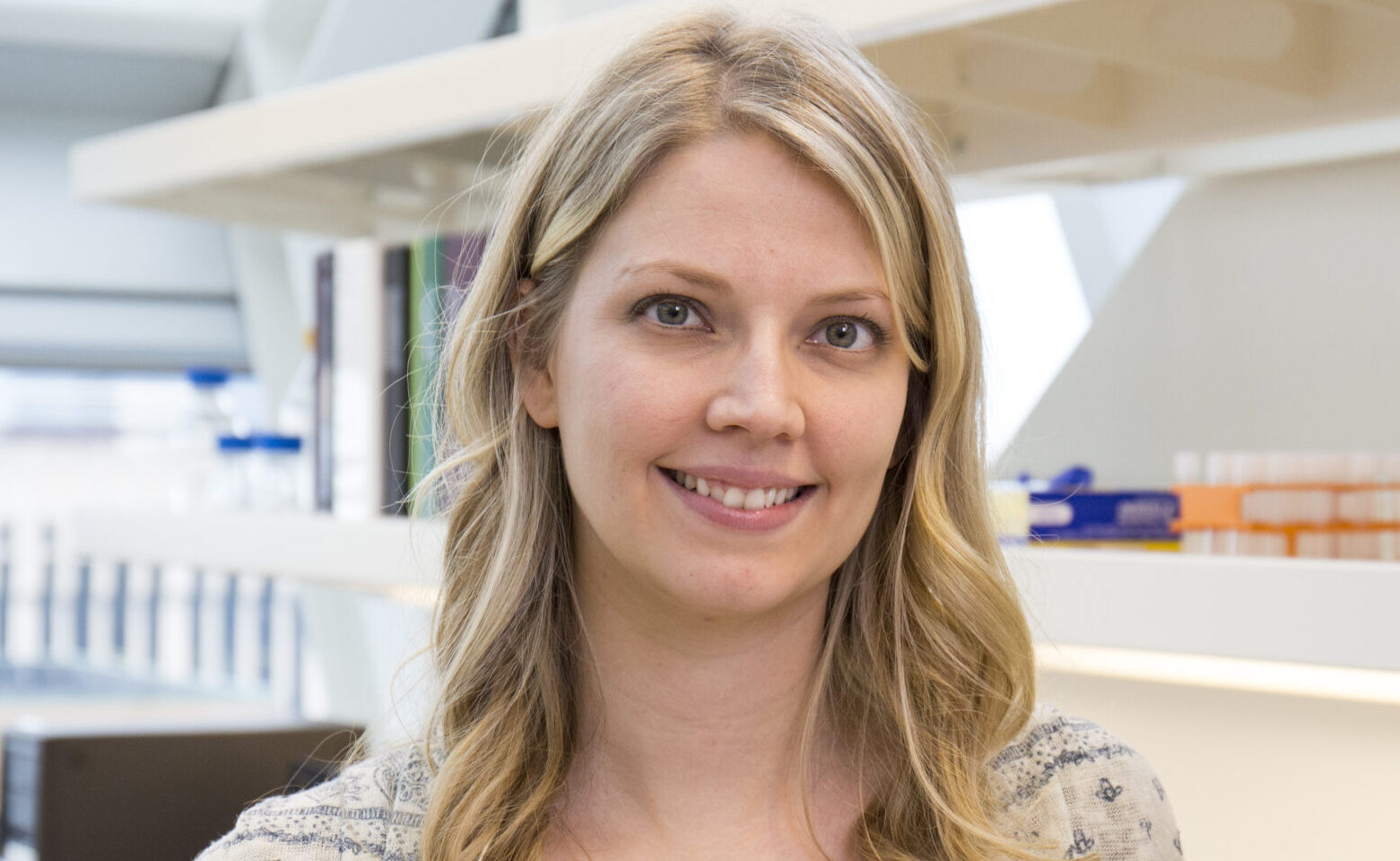Graduate student spotlight: Searching for new ways to treat a rare genetic disease
December 7, 2017

Every other month, we highlight one of Van Andel Institute Graduate School’s doctoral students. This month features Jamie Grit, a student in the laboratory of Dr. Matt Steensma. Jamie studies a disease called neurofibromatosis type 1 (NF1), which causes tumors to form on nerves, primarily in the brain and skin. People with NF1 are more susceptible to developing cancer and other health problems, such as congenital heart defects and learning disabilities.
We caught up with Jamie to ask about her work and what it’s like to pursue a Ph.D.
How would you describe your area of study to your grandmother?
I study an inherited disorder called neurofibromatosis type 1 (NF1). One of the symptoms of NF1 is an increased risk for developing cancer, and a big problem that these patients face is resistance to traditional chemotherapies. I’m testing new drugs on NF1 cancer cells and, unfortunately, the cancer cells are pretty resistant to the new drugs too. Now I’m trying to figure out how the NF1 cancer cells are able to survive drug treatment so that next I can try combining different drugs to kill the cells. I’m testing drugs that are already used for treating other types of cancer, so that once I find a combination that works it will be easier to translate it to actual NF1 patients.
What is your main motivation for persevering through graduate school?
I found my love for science a little later in life, and quit my job to pursue my Bachelor of Science degree and do undergraduate research. This was during the recession and my husband is a carpenter so he did not have much work at that time. It was a huge financial sacrifice for us, but totally worth it because I love doing research and learning new things all the time. Even though graduate school can be really difficult sometimes, I am still having fun and am happy to be here!
How has your previous coursework contributed to your breadth of knowledge?
The most important thing that my coursework has given me is a scientific vocabulary. Even if I can’t remember the details of a certain cell signaling pathway, I can quickly look it up and comprehend what I’m reading.
Do you think there is any value in social networking with other graduate students in non-related fields?
Yes, it’s always interesting to learn about a new field.
How do you think earning an advanced degree will change your role in society?
Having an advanced degree will mean that I am an ambassador for my field. It comes with a responsibility to communicate what scientists are trying to do and why!
Did your past experiences in life or education help prepare you for graduate school or did you have to develop different strategies to succeed?
Starting graduate school was a lot more challenging to me than life or undergrad because I had to learn to let things go! There was simply no way for me to stay on top of everything—classes, research, seminars, social time, volunteering, etc. I had to learn be satisfied with being unsatisfied with my performance almost every single day, and that was a tough lesson!
What is your favorite stress-reduction technique?
Baby wearing. I put my daughter in her carrier and we walk around the neighborhood until she falls asleep. It helps relax us both!
What accomplishment (academic or other) are you most proud of?
Going back to school to get my undergraduate degree is something that I will always be very proud of. Just simple things like figuring out where to park and where classes were was so hard for me those first few weeks! Even after I get my Ph.D., I think that I will be prouder of my first semester report card from community college than I will be of my doctorate degree!
Has your perception of this Ph.D. program changed since you began the program?
I did undergraduate summer research at Van Andel Research Institute, so I got to see what the graduate program was like. I could tell that the students were valued and treated as colleagues, and it’s something I’ve really appreciated throughout my time here.
If you were asked to put something in a time capsule for each year you have been in the program and this capsule would not be opened for 25 years, what would you contribute?
I think I would put in a failed western blot for each year—although I could probably put in a failed western blot for each month! I really hope that western blots will be obsolete in 25 years.
If you hadn’t been admitted to graduate school, what do you think you would be doing right now?
I’d be a yoga teacher.
To learn more about Van Andel Institute Graduate School and its academic program, please visit vaigs.vai.org.